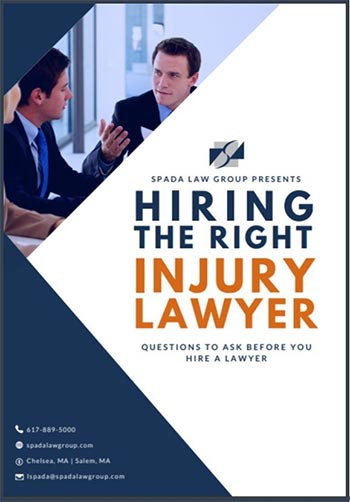What Do I Do With Late Appearing Injuries After My Accident?![Delayed Pain Personal Injury Accident Lawyer Boston]()
It has become clear to me after representing people injured in car accidents for over 20 years that people seldom know the full extent of their injuries immediately after the crash. Client’s often believe they are ok, just a bit “shaken up” after an accident if they can walk away from the crash; only to learn days or weeks later that they sustained a more serious injury. The delay between the accident and a full awareness and treatment of an injury often presents a major challenge to clients when they are seeking compensation for their injuries from the at fault driver. In this blog we will discuss why some injuries go unnoticed for days or weeks after an accident, the most common types of delayed onset injuries, why delayed onset injuries can make settling your case more difficult and what an injured person can do to ensure that they receive full compensation for all their injuries related to the car accident.
Why Do Some Injuries Go Unnoticed for Days or Weeks After an Accident?
It is not uncommon for someone after an accident to believe they weren’t hurt. Perhaps it is just their gratitude that they are alive and not seriously hurt that leads them to believe they are fine. There they can walk, they can talk, they are not bleeding, nothing is broken, so they assume they just got lucky. Several days or weeks go by and they realize that they now have pains they never had before and that maybe they really did get hurt in the accident. In some accidents a person's injuries are obvious. Broken bones, cuts, burns etc. are immediately obvious in some accidents. These injuries are clearly related to the accident. Other injuries, such as sprains, strains, ligament tears, bruises, concussions, herniated discs and PTSD are not be immediately visible or known to the injured person until days or weeks later. After a car accident our adrenaline is flowing which temporarily masks symptoms of pain. It's how our body works. For this reason, you may not know that you tore a rotator cuff in your shoulder or a meniscus in your knee or herniated a disc in your neck or back. It may not be for days, after the rush of adrenaline has subsided, that you are able to feel the pain symptoms from these injuries.
The Most Common Types of Delayed Onset Injuries
In our experience, the following are some of the more common types of delayed onset injuries after a car accident:
- Back pain from injury to muscles ligaments or discs;
- Abdominal pain caused by bruising or internal bleeding;
- Neck and shoulder pain and limited range of motion;
- Torn rotator cuffs
- Torn meniscus in the knees
- Numbness or tingling in one's legs, arms or hands due to a herniated disc and pinching of nerves;
- Concussions;
- Headaches
- Vision or hearing problems caused by brain trauma;
- Mental health issues such as nightmares, depression, anxiety, sleep disturbances, or other symptoms often related to posttraumatic stress disorder (PTSD).
Many people are reluctant to seek medical treatment for injuries they initially thought were “minor". I have had clients who tried to “tough it out" in the hope that they would heal quickly from their injuries. These clients only seek medical care when they can no longer live with the pain and they see no improvements with time.
Why Delayed Onset Injuries Can Make Settling Your Case More Difficult?
For clients who do not notice or treat for a car accident related injury soon after the accident, getting full compensation for these injuries can be difficult. Insurance companies are not in the business of settling claims easily. They want proof that an injury is related to the car accident. When there is a long delay between the accident and the complaints of pain and treatment, insurance company often takes the position that the injury is not related to the car accident. Their argument is often quite simple, if a person really was injured and suffering pain, they would've sought medical attention sooner. For the reasons stated above, this argument is weak and does not comport with the realities of how we live our lives. So, it is up to the client and their attorney to take necessary steps early in the process to address this challenge in order to ensure full compensation for the client.
What You Can Do to Make Sure You Can Recover for Delayed Onset Injuries
Clients need to be more aggressive in the way they address symptoms after a car accident. This means that after a car accident, you should get checked out by a medical professional as soon as possible. You should be a good historian of your symptoms as soon as they present themselves. If your neck is bothering you, even though you think it might not be serious, you should mention it to your doctor right away. If a week after the accident, your back still hurts, go back to the doctor. Don’t wait too long to address lingering or new symptoms. It is important to remember that after car accidents what is documented in your medical records is what the insurance company is likely to believe. If it's not in a medical record the insurance company isn’t buying it. Well documented medical records establish the reason for your visit (pain related to a car accident) and help you and your attorney establish the required connection between your injury and the car accident. I can't tell you how many times we have had unnecessary difficulties resolving a client's case for full value because the client waited too long to seek medical treatment. The more time that elapses between the accident and the complaints of pain, the harder it is to say that the accident “caused” the injury. So, I tell clients, be aggressive with your own medical care. If you are experiencing pain after an accident, err on the side of caution and get to a doctor. If it turns out to be nothing or something minor, great. But if it is an injury related to your accident you have a better chance of healing quicker AND getting rightfully compensated for all your related injuries.
How Do I Handle My Insurance After a Delayed Injury?
Another thing you can do is NOT sign anything from the insurance company before discussing it with an experienced personal injury lawyer. Insurance companies will often try to offer an injured person a quick settlement after an accident. Once you settle with the insurance company however you can’t come back later and get additional compensation if you discover you have additional injuries. This is exactly why some insurance companies make quick, low settlement offers soon after car accident. They want to pay you as little as possible as quickly as possible in the hopes that if you have more serious injuries they won’t be paying you for them. Prior to signing any documents, you owe it to yourself to speak to a lawyer to ensure that your rights are protected and that you are not being taken advantage of by an insurance company.
The best thing you can do if you are injured in a car accident and want to be fairly compensated is to understand your legal rights before you make any decisions. Before you speak to an insurance company adjuster, sign or submit any paperwork or hire a lawyer, you owe it to yourself to get as much information as you can, so you can make a smart decision on what you need to do next. At Spada Law Group, we offer free consumer guides and videos that answer many of the questions car accident victims have. Take a look, download our free information or contact us for a free consultation. Learn what Spada Law Group is all about and how we might be the right personal injury lawyers for you and your case.




